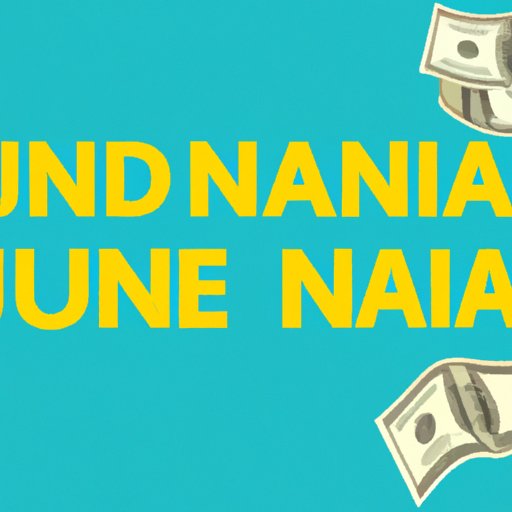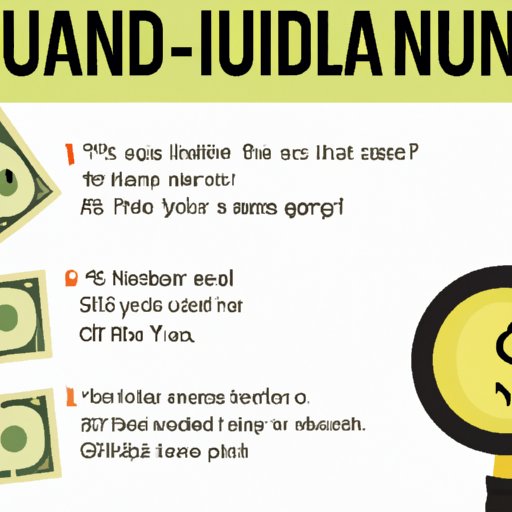
Introduction
Unclaimed money is money that has been lost or forgotten about, and it can happen more easily than you may think. It might be an old paycheck or deposit that was never picked up, an inheritance you didn’t know about, or even just a utility bill credit that you never claimed. Checking for unclaimed money in your name is an important step to take and it doesn’t have to be difficult. In this article, we will provide you with an ultimate guide to finding unclaimed money in your name
The Beginner’s Guide to Finding Unclaimed Money in Your Name
Unclaimed money, also referred to as lost money, is unclaimed funds or assets that have been left inactive or untouched for a specific period, usually after three to seven years. Some of the most common sources of unclaimed money include abandoned savings or checking accounts, dividends, securities, or insurance policies with no known beneficiaries. The process of finding unclaimed money may seem daunting, but in reality, it is a simple process.
The first and most important thing to do when searching for unclaimed money is to look in multiple sources. Some unclaimed funds may be held by state unclaimed property departments, or federal agencies such as the Internal Revenue Service (IRS) and U.S. Department of Treasury. It is essential to regularly perform a search for lost money, to avoid losing it permanently.

5 Simple Steps to Discovering Your Unclaimed Money
Here are the steps for locating unclaimed money:
1. Check state government websites
Most states have a website where you can search for unclaimed money. You can search using your first and last name and the specific state where the money was held. You can also submit a claim request on the website.
2. Search the National Association of Unclaimed Property Administrators (NAUPA) database
The NAUPA maintains a national database of unclaimed money records. You can search their database by name and state, and find out if any state has unclaimed funds of yours.
3. Look for unclaimed funds from the IRS and other federal agencies
You may have unpaid taxes or refunds that were never claimed. Be sure to check with the IRS to look for any unclaimed tax refunds or credits that may be owed to you.
4. Check with previous employers and retirement accounts
If you have worked for different companies in the past, you may have unclaimed money in the form of an unpaid wage or pension benefits. This money is held by the Pension Benefit Guaranty Corporation, and you can search their database to see if they are holding your unclaimed money.
5. Research unclaimed inheritances and insurance policies
You may have an inheritance that you never claimed or an insurance policy that a family member left to you when they passed away. You can find out what life insurance policies you may be a beneficiary of through the National Association of Insurance Commissioners.
Unclaimed Money 101: How to Track Down Funds Owed to You
When you are searching for unclaimed money, it is not that difficult, but it is essential that you know where to start searching. When searching on state government websites, be sure to use variations of your name, including any maiden or married names you have used in the past. Make sure to also check any states that you have resided in because that is where the unclaimed money would likely be held.
If you are searching for lost or forgotten life insurance policies or claims, make sure to have the information such as the policyholder’s name, policy number, and the insurance company name. For pension benefits, keep a record of the name of your employer, any employee identification number or the pension plan number.
Be careful when searching for unclaimed money. Be sure to use reliable sources and avoid any websites that request a fee to perform the search. You can also save the search results as it may be necessary for you to provide proof of your identity to claim the funds later.
The Ultimate Search: Finding Unclaimed Money in Your Name
There are many additional sources of unclaimed money that you may not know about. These include unclaimed utility bill deposits, old stock certificates, and uncashed checks from banks, insurance companies, even the Internal Revenue Service. You may be also eligible for a refund of overpaid utility bills or a security deposit that you forgot about. Check with local utilities and city, county, and state treasurers to find out if you have any unclaimed or unused funds.
To get a complete search for unclaimed money, think beyond what you can see, and go to the financial institutions you may have used. For example, if you have opened a savings account when you’re 18 and forgot about it, you must check with that particular bank to see if you have any unclaimed funds that were transferred to the state being recorded as lost, rather than abandoned.
The Top Tools and Tactics for Finding Unclaimed Money
When searching for lost money, using online resources and tools can be effective. State websites, the NAUPA database, and other valuable tools can assist you in your search for unclaimed funds. One such tool is ‘MissingMoney.com,’ a free website that helps you find unclaimed property in different states and gives you access to the state’s websites. There are also other websites and apps which can help you find your unclaimed funds or manage your finances better.
Additionally, some paid services are available that will assist in finding lost money for you, although this is not necessary if you know how to complete a thorough search in the previously mentioned public databases and financial institutions’ intakes.
10 Commonly Overlooked Places to Find Unclaimed Money
Here are ten places where you may have unclaimed money, but most people overlook:
- Savings bonds
- Forgotten bank accounts
- Credit balances on utility accounts
- Retirement benefits or 401k
- Overpayment of medical expenses
- Veteran’s government life insurance
- Security deposits on rental property
- Unclaimed vacation compensation
- Beneficiary proceeds from insurance policies
- Money left on dormant prepaid debit cards
Your Money: Finding and Claiming All the Funds That Belong to You
It’s important to check regularly for unclaimed money since the state administrators that hold it are continuously updating their databases, and unclaimed funds are at risk of being seized and used by the states.
Here are some final tips and resources to help you find and claim all the funds that belong to you:
- Check all the states where you have lived in the past for unclaimed money
- Use online search tools to streamline your search
- Contact the Unclaimed Funds division for any assistance you may require
- Never pay someone to search for unclaimed money on your behalf
- Save copies of all the documents before submitting a claim
Conclusion
Unclaimed money is quite common, and many people may not even know that they have money waiting for them. Take advantage of the different resources we have provided to begin your search for lost funds. Don’t forget to check multiple sources and never give up. Your money is out there waiting for you, so go ahead and claim what is rightfully yours.





